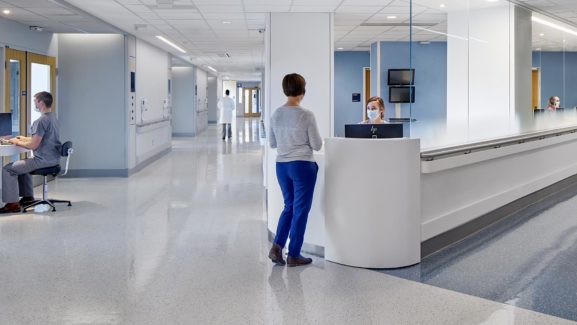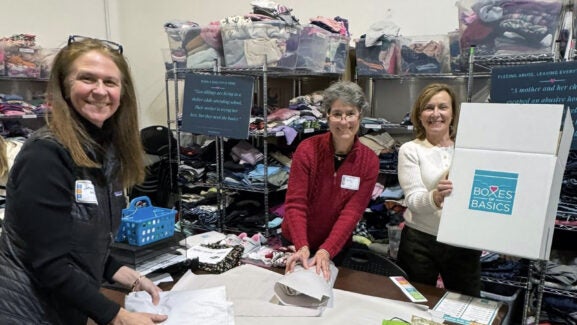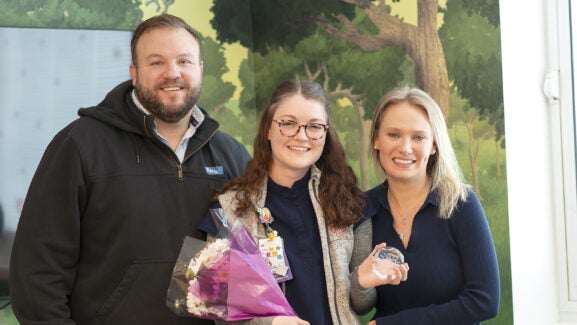
Helping Homeless Patients With an Inpatient Consult Service
At UVA Health, we want to ensure all patients receive the best possible care. That means providing different services for our patients’ varying needs. Vulnerable populations, like those experiencing homelessness, suffer from high readmission rates, and discharging them can be complex. To better serve this community, UVA Health has implemented the Homeless Inpatient Consult Service.
This service was created by Jacqueline Carson, a recently graduated MD/MPH student, and is led by Ross Buerlein, MD, Assistant Professor of Medicine (above, left), and Matthew Allen, MD (above, right), a third-year primary care resident. Connect recently sat down with Dr. Buerlein to discuss the program.
What is the Inpatient Homeless Consult Service? What is the goal of this service?
Buerlein: Studies have shown that, when compared to the general population, patients experiencing homelessness have significantly higher rates of emergency room visits, hospital admissions, and readmissions to the hospital. While there are a lot of complex variables that drive this process, many of these reasons arise from lack of coordination of care. Our team of medical students, residents, and attending physicians are working to help recognize and overcome many of the barriers to care faced by this population of patients who are admitted to the hospital, and we create individualized care plans and assist in post-discharge follow-up arrangements. We hope to make a meaningful impact for our patients which can extend well-beyond the immediate post-hospital-discharge time.
Why is discharging a patient experience homelessness complex and/or challenging?
Buerlein: Hospital discharge is a vulnerable time for any patient due to changes in medications, patients not feeling completely well, new diagnoses, and numerous post-discharge follow-up appointments that need to be arranged and attended. For patients experiencing homelessness, these issues are often compounded by lack of transportation to appointments, lack of housing or challenges getting into shelters (sometimes requiring discharge to the streets), lack of funds to obtain prescribed medications or necessary medical equipment, lack of safe storage for certain medications (like insulin which typically requires refrigeration), lack of cell phones or email access for assisting in post-discharge follow-up, higher rates of substance abuse and/or psychiatric disease, among many others.
Why are the readmission rates for this demographic high?
Buerlein: The reasons for higher rates of readmission in this demographic are multifactorial and include the reasons listed above which make hospital discharge challenging, in addition to many others. For example, patients experiencing homelessness are known to have higher rates of certain medical conditions (like pulmonary disease) that can predispose them to relapses of their conditions, particularly given the environmental impacts of their living situation (like sleeping outside in the cold). Additionally, this population has great difficulty making it to hospital follow-up appointments for many reasons (lack of transportation, lack of funding for transportation or medications, lack of access to cell phones or email for appointment reminders, among many others).
A student created this program?
Buerlein: Yes! Jacqueline Carson created it. She got the idea when she encountered a patient during her medicine clerkship who was experiencing homelessness. Last December, Wendy Horton, CEO, UVA Medical Center wrote about it on her blog, Vision and Voice. You can read about it here.
What is your role in this service?
Buerlein: I help lead and serve as an advisor for this consult service, and much of the day-to-day work is done by our excellent team of medical students who are led by several fourth-year medical students (Sarah Flores, Sloane Mctavish, and Lydia Hanson) and Matthew Allen, MD (graduating PGY-3 resident who is fortunately staying on as Internal Medicine faculty at UVA). I cannot understate the role they have played in his service.
How do team members contact this consult service? Walk us through what happens when a team member calls for this consult.
Buerlein: For a patient admitted to the hospital who is experiencing homelessness, any team member for the patient can page our team (PIC 1078) on Monday through Friday, from 8 a.m. to 5 p.m., to request a consult. One of our medical students who has undergone training with our team will answer the page, and our team will see the patient and work with the primary team to help recognize and overcome barriers to discharge. We also work closely with UVA's Interactive Home Monitoring (IHM) Program who helps to follow the patient after discharge and to advocate for them. IHM has been an excellent partner throughout this whole process.
What resources can team members share with those who are experiencing homelessness?
Buerlein: Our team created “The COVID Street Sheet” which can be found easily with a quick internet search. This is an excellent resource that gets updated frequently and contains a wide-array of various services available within the community.
Is there anything else team members should know?
Buerlein: Please contact us as early as possible within the patient's hospital stay. Many patients have never stayed at shelters, and there is a lengthy registration and intake process that needs to occur prior to discharging a patient to a shelter. Additionally, it ensures we have the time to maximize the resources we can provide our patients.
Latest News



